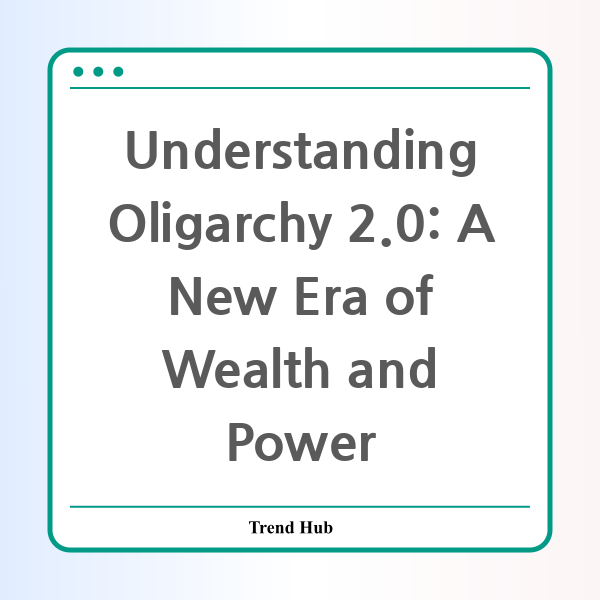* This website participates in the Amazon Affiliate Program and earns from qualifying purchases.

Is America witnessing the rise of "Oligarchy 2.0"? This term has become increasingly relevant as President Joe Biden recently warned of the dangers posed by the ultra-wealthy and their growing influence, particularly from the tech sector. The warning resonates through the political landscape, implying a threat to American democracy and the fair opportunities that every citizen should have.
In his speech, President Biden emphasized the formation of an oligarchy in the U.S., where extreme wealth and power are concentrated among a few individuals, creating an imbalance that undermines democracy. Biden pointed specifically to the "tech-industrial complex," which he believes poses significant risks to democratic values and the rights of everyday citizens. This narrative has sparked discussions among historians and economists who recognize the alarming proportions of wealth inequality in contemporary America.
The statistics are staggering. Currently, the top 1% of Americans possess about 35% of the nation’s wealth, while the bottom 50%, comprising around 150 million people, hold merely 1.5%. Such discrepancies reflect conditions akin to a modern-day oligarchy, where those in the upper echelons wield unprecedented influence over government policies and public discourse.
Experts like Daniel Kinderman describe this scenario as a "turbocharged technological oligarchy." He argues that the CEOs of major tech companies, such as Elon Musk and Jeff Bezos, not only influence public policy but also shape the general sentiment in society, often prioritizing efficiency and corporate interests over the well-being of the populace.
While the historical context shows that Americans have a track record of resisting oligarchies—often through labor movements and civic engagement—the current environment presents a unique challenge. As Biden likened the current situation to that of the "robber barons" of the 19th century, there is a growing concern about how deeply these modern-day oligarchs can embed themselves into the fabric of governance.
Interestingly, the reactions to Biden’s speech began surfacing in real-time, with a noticeable spike in searches for the term "oligarchy" across various states—predominantly in Republican-dominated areas. This indicates a bipartisan unease regarding wealth concentration and its implications. Many Trump supporters, who once viewed the former president as a champion of the working class, might find themselves at odds with his evolving alliances with tech elites.
As we navigate this new landscape, the question looms: what will this alliance between Donald Trump and the tech oligarchs result in? Will it lead to policies that support working-class Americans, or will it primarily serve the interests of the wealthy? Historically, movements against oligarchies have gained momentum when the public perceives a threat to their livelihoods, leading to a potential resurgence of labor unions and grassroots activism as citizens demand accountability and equity.
Biden's references to past labor movements underline the notion that, while the wealthy may hold tremendous power, they can also be compelled to adhere to rules that ensure fairness and equal opportunity. The changing consumer landscape reflects this sentiment, as public backlash against corporate decisions can significantly impact companies bottom lines. For instance, when Bezos faced criticism for his editorial decisions at the Washington Post, a substantial number of subscribers opted to cancel their subscriptions in protest, demonstrating the potential for collective consumer action.
Ultimately, the future of this oligarchic alliance is uncertain. History suggests that when business interests conflict with public welfare, repercussions may prompt even the most powerful players to reconsider their positions. As we continue to observe this evolving narrative, it’s crucial for citizens, regardless of political affiliation, to stay informed and engaged, advocating for a balanced approach that promotes democracy and equity for all. This is not just a political issue but a social one that affects the core values of American society.
* This website participates in the Amazon Affiliate Program and earns from qualifying purchases.